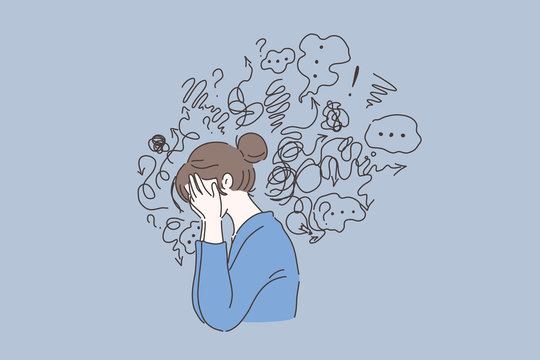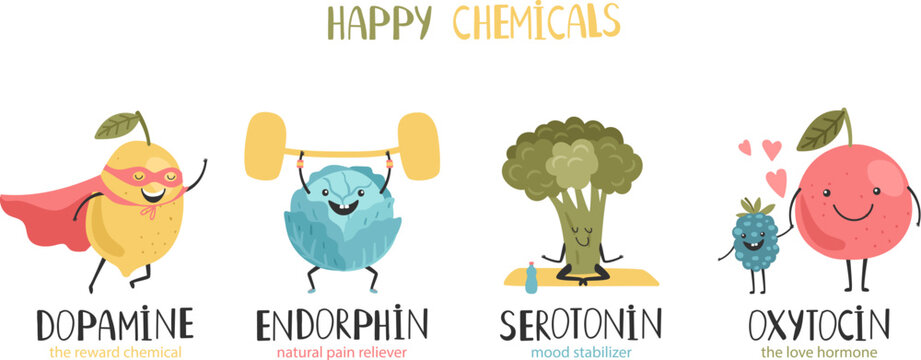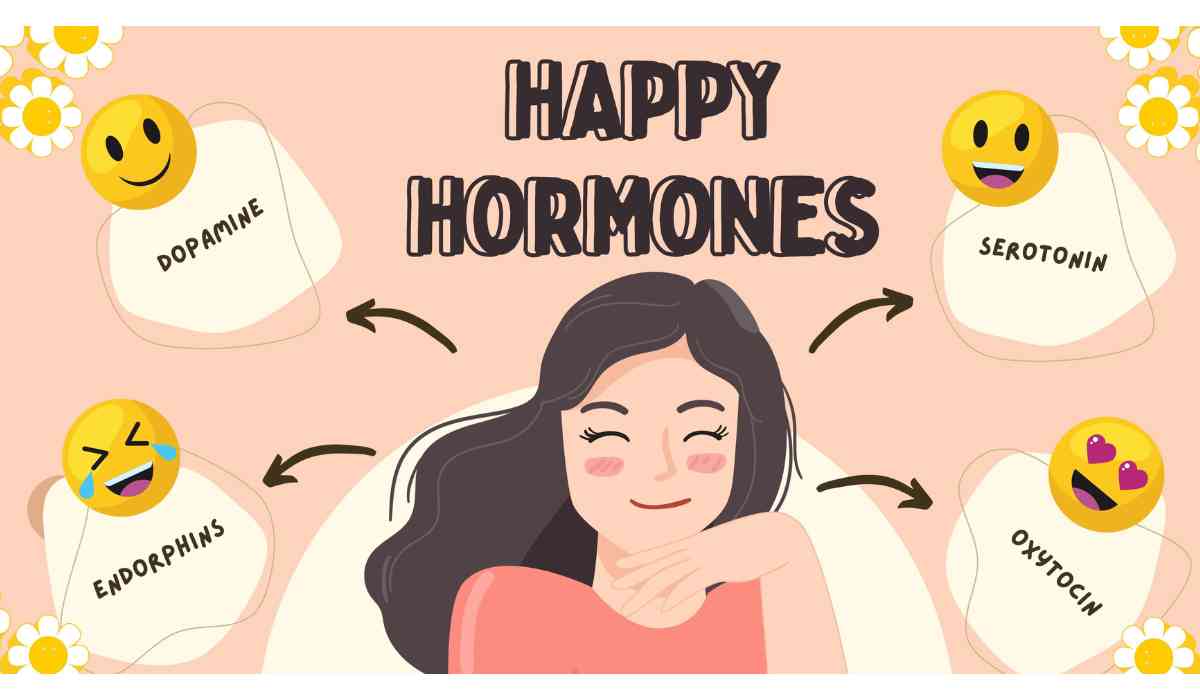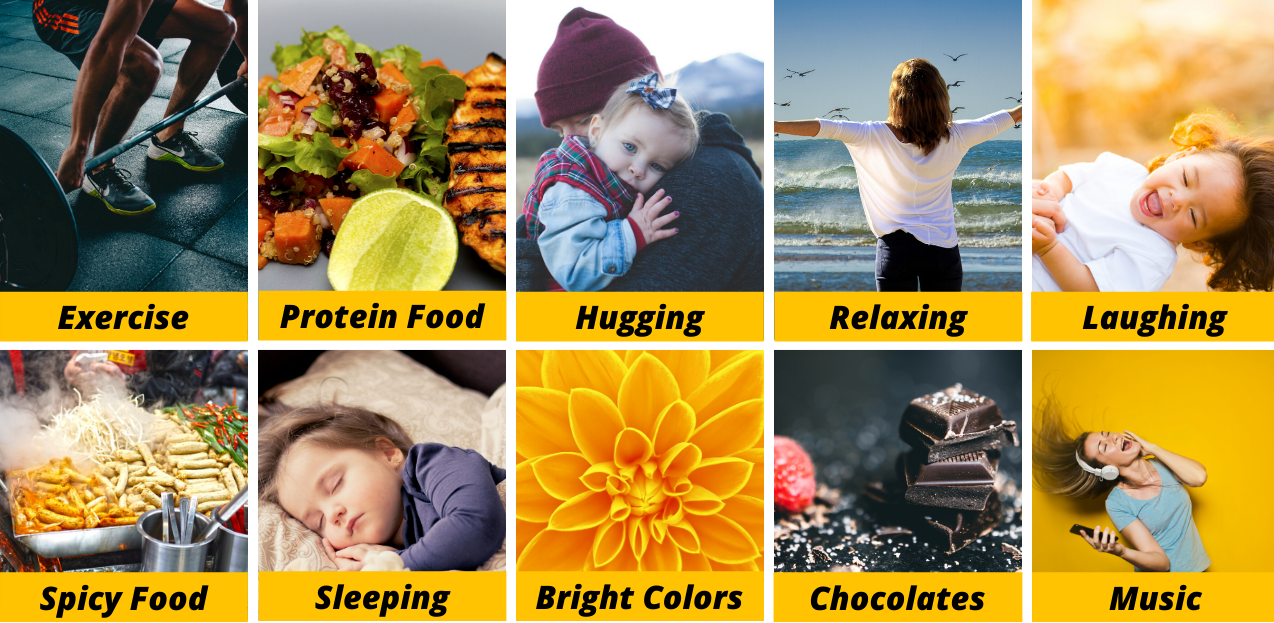Are you depressed or struggling with job, family, or personal issues? Don't worry! There are several strategies to promote happiness and increase your body's natural feel-good hormones. It's all about figuring out which activities stimulate these hormones and implementing more of them into your everyday routine.

The Science of Happiness:
Hormones are the body's messengers, controlling everything from physical function to emotional well-being. Interestingly, many of these hormones are regulated by our thoughts, behaviors, and even the foods we eat. Understanding these hormones and how they act can help you design ways to feel better.

A variety of hormones and neurotransmitters can make us feel better. And there are numerous ways to cause the production of these hormones. Here's a closer look at the four major happiness-boosting hormones:
Dopamine, also known as the "happy hormone," promotes emotions of well-being and serves as the major driver of the brain's reward system. Pleasurable experiences, such as receiving praise at work or falling in love, cause dopamine levels to rise. "Dopamine produces that high we get from food, sex, shopping—pretty much any enjoyable activity,"
Serotonin, also known as the "feel-good hormone," plays an important role in reducing anxiety and depression. SSRIs (selective serotonin reuptake inhibitors), a prevalent type of antidepressant, act by raising serotonin levels in the brain. Exercise, spending time outdoors, and getting enough sleep can all naturally enhance serotonin levels.
Endorphins are linked to the phenomena known as "runner's high," and they are related to reducing pain and enjoyment. Cardiovascular activity is one of the most effective strategies to increase endorphins. "These powerful hormones act as natural pain killers, helping athletes push past pain during tough races or big games,"
Oxytocin, also known as the "love hormone," plays an important role in bonding and attachment, particularly during childbirth and breastfeeding. Intimate touches, such as holding hands, hugging, kissing, massage, and intercourse, can also cause an increase in oxytocin.
What is Neurotransmitter?
Neurotransmitters are chemical messengers in the brain that carry signals between neurons through synapses. They regulate a variety of functions, such as emotion, sleep, and muscular movement. Examples include dopamine, serotonin, and acetylcholine. Imbalanced neurotransmitter levels can cause mental and neurological issues.
Activities that Increase Feel-Good Hormones.
While there is no definite way to stimulate your feel-good hormones, a variety of activities can naturally boost all four happiness hormones. Some favorites are:
- Cuddling with a loved one can boost oxytocin levels, creating emotions of closeness and comfort.
- Exercising can raise both endorphins and serotonin.
- Experimenting with aromatic therapy: Certain scents might improve mood and induce relaxation.
- Massage therapy promotes relaxation and oxytocin levels.
- Sex stimulates dopamine, oxytocin, and endorphins.
- Listening to feel-good music. Music can uplift and boost people while also increasing dopamine levels.
- Meditating: This can boost serotonin and dopamine levels, fostering feelings of peace and happiness.
- Spending time outdoors: Sunlight might boost serotonin.
- Taking a nap: Restorative sleep might assist regulate serotonin production.
- Watching a comedy: Laughter stimulates endorphins and dopamine.
What foods do we eat to boost our happy hormones?
Dopamine:
Dopamine is found in protein-rich foods including chicken, turkey, eggs, and dairy products, which include the amino acid tyrosine. Bananas, avocados, and nuts all help produce dopamine.
Serotonin:
Tryptophan-rich foods include salmon, turkey, eggs, cheese, and tofu. Complex carbs such as whole grains, oats, and sweet potatoes boost tryptophan availability in the brain.
Endorphins:
Spicy meals with capsaicin can trigger endorphins. Dark chocolate contains chemicals that can cause endorphin release.
Oxytocin:
Magnesium-rich foods including dark leafy greens, nuts, seeds, and whole grains promote brain health and hormone control, including oxytocin. Eating comfort foods with loved ones can also help enhance oxytocin levels by stimulating an emotional connection.
There is no right technique to increase any of these feel-good chemicals. The trick is to listen to your body and note how different activities make you feel, both in the time and afterward.

If you're still feeling low after attempting these activities, it may be time to see a doctor. You may be low in key nutrients such as vitamins B12 and D, or you may be experiencing worry when the world reopens. So, whether it's petting your pet, dancing to your favorite music, or taking a walk in the park, figure out what makes you happy and make it a regular part of your life. After all, happiness is more than simply a mental state; it is also a hormonal one!
Inputs: Agencies
Image Source: Multiple agencies
© Copyright 2024. All Rights Reserved Powered by Vygr Media.






















